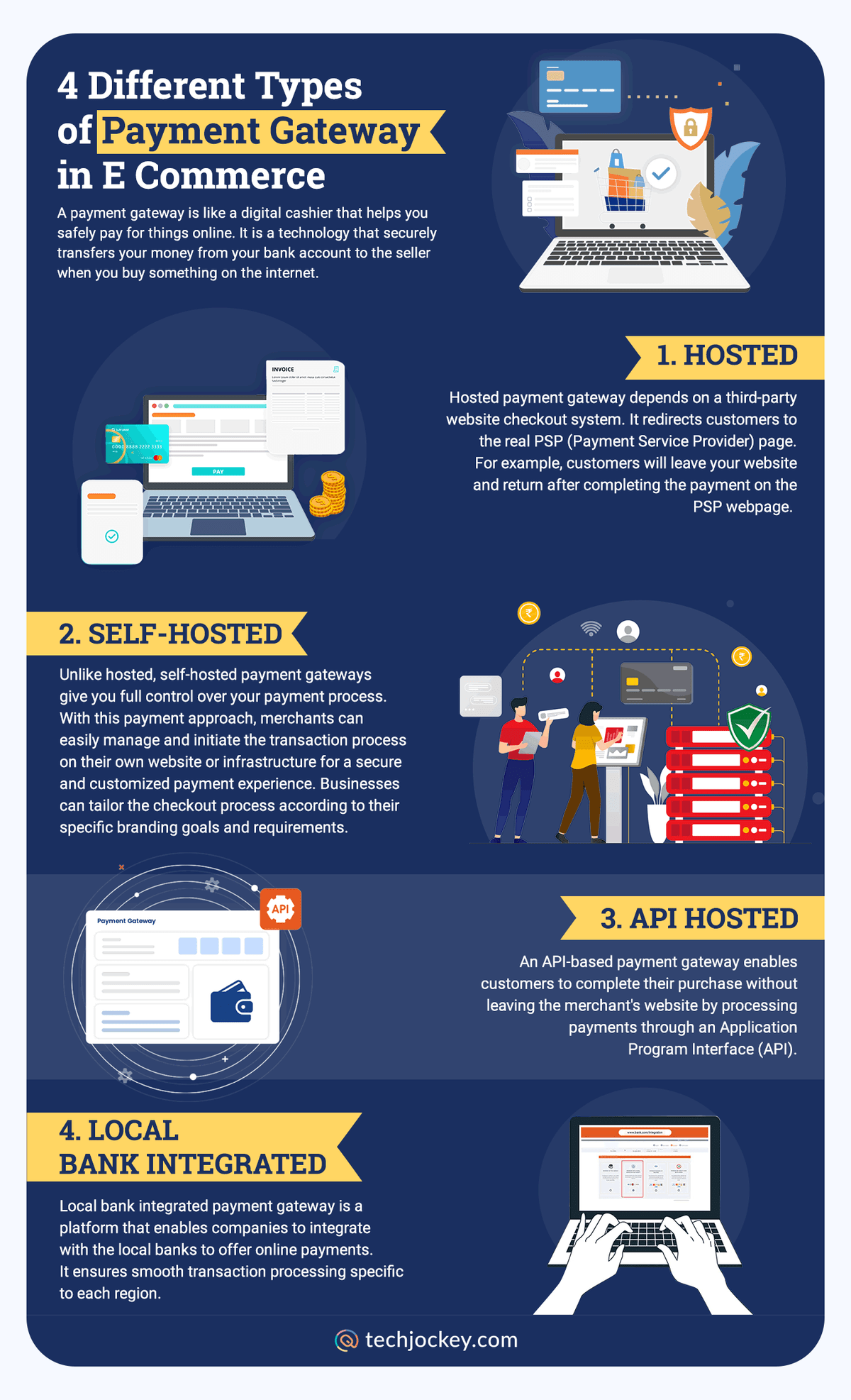Summary: Let’s discover the different types of payment gateways, their unique features and benefits. It will help you to make an informed choice that aligns with your business requirements. Whether you’re an online retailer, a subscription service, or a global e-commerce platform, these payment gateway options are vital for a seamless, secure, and efficient payment processing experience.
According to Statista, nearly half of the E Commerce payments are made online. Moreover, the number of online payments is expected to grow by 54 percent in 2026. (Source)
The above data is enough to understand that the cashless transactions are nearly dominating the digital payment market. So, in response to that, payment gateways have emerged as the marvels behind seamless online payments.
Payment gateways have become an essential part of our digital lives. But do you know that there are different types of payment gateways? In this blog, we will provide you with an in-depth look at the various types of payment gateways and their unique features, so that you can opt for the best suited payment gateways according to your requirements.
4 Different Types of Payment Gateway in E Commerce

A payment gateway is like a digital cashier that helps you safely pay for things online. It is a technology that securely transfers your money from your bank account to the seller when you buy something on the internet.
Payment gateways offer secure digital transactions, easy online payments, and reduce COD costs for businesses. So, if you are thinking of using a payment gateway for your website, you must think about your needs, infrastructure and the types of payment gateways in eCommerce. There are 4 types of payment gateway in eCommerce, and these are: Hosted, Self-Hosted, API Hosted, and Local Bank Integrated.
The primary difference between these four types of online payment gateways is how they are integrated into your website. Now, let’s take an in-depth look at all those payment gateway types to fully understand them.
1. Hosted Payment Gateway
Hosted payment gateway depends on a third-party website checkout system. It redirects customers to the real PSP (Payment Service Provider) page. For example, customers will leave your website and return after completing the payment on the PSP webpage.
How Does Hosted Payment Gateway Work?
When a user starts a payment (click on “Buy Now” button), the payment gateway initiates transaction process on their own server, and handles all the payment related details like Card Number, Customer ID, Name, etc. Once the payment is done or declined, it sends the status to the merchant’s website or the app.
Features of Hosted Payment Gateway
- High security and trust, as these types of payment processors will be your bank or wallet that you choose.
- Multiple payment options for customers
- Mobile responsive checkout
- Merchant dashboard tools
When to Use Hosted Payment Gateway?
You can choose the Hosted payment gateway for an easy onboarding, integration, high security and compliance. Moreover, this payment gateway type makes it quite easy to accept payments online or on a mobile device.
Pros and Cons of a Hosted Payment Gateway
- PCI DSS Compliant
- Straightforward and easy setup, no need for in-depth technical knowledge
- Maintained by service providers
- There is little to no scope for customized branding
- May affect the user experience if there is any server issue
Where is Hosted Payment Gateway Used the Most?
The hosted payment gateways are mostly used in online stores, online booking and bill payment websites.
2. Self-Hosted Payment Gateway
Unlike hosted, self-hosted payment gateways give you full control over your payment process. With this payment approach, merchants can easily manage and initiate the transaction process on their own website or infrastructure for a secure and customized payment experience. Businesses can tailor the checkout process according to their specific branding goals and requirements.
How Does a Self-Hosted Payment Gateway Work?
When a user initiates the payment, the self-hosted gateway starts the transaction process on the merchant’s website. Businesses can collect all the payment details and transmit it to the payment providers to accept or decline the transaction.
Features of Self-Hosted Payment Gateway
- Business has the full control and ownership of the user’s data
- Customized payment processing
- Easy integration with website
When to Use a Self-Hosted Payment Gateway?
It’s the right choice when you want to maintain your brand identity and manage transactions independently. This type of payment gateway is often used by larger enterprises and e-commerce platforms.
Pros and Cons of a Self-Hosted Payment Gateway
- Lower cost compared to the third-party providers
- Enhanced customer trust
- Greater flexibility in branding and customization
- Requires technical expertise to setup
- Businesses have a huge responsibility to look after users’ data
Where Is Self- Hosted Payment Gateway Used the Most?
This type of online payment gateway is widely used in eCommerce platforms, subscription-based services, crowdfunding platforms, etc.
3. API Hosted Payment Gateway
An API-based payment gateway enables customers to complete their purchase without leaving the merchant’s website by processing payments through an Application Program Interface (API).
Stripe is an example of an API-hosted payment gateway. It provides a set of APIs that developers can use to integrate payment processing features into their own websites or applications. Through these APIs, merchants can securely process payments without the need to build and maintain their own payment infrastructure.
How Does the API-Hosted Payment Gateway Work?
When a customer starts a payment, the API-hosted payment gateway securely sends payment information to the payment processor. The processor then sends back the transaction status to confirm it on the website or app.
Features of API-Hosted Payment Gateway
- Multiple payment methods
- High security and trust
- Mobile optimization
- Global reach
When to Use an API-Hosted Payment Gateway?
You can use an API-Hosted payment gateway solution for your e-commerce website. This payment gateway type ensures secure and efficient payment processing. With this approach, your customers enjoy seamless transactions while your business receives prompt payments.
Pros and Cons of an API-Hosted Payment Gateway
- Payment is handled on merchant’s website only
- A seamless payment experience for customers
- Supports international currencies
- API-hosted platform fees are higher than others
Where is API- Hosted Payment Gateway Used the Most?
API-Hosted payment gateways are used in various industries like retail, hospitality, subscription services, and much more. These are commonly used by larger or established businesses.
4. Local Bank Integrated
Local bank integrated payment gateway is a platform that enables companies to integrate with the local banks to offer online payments. It ensures smooth transaction processing specific to each region.
How Local Bank Integrated Payment Gateways Work?
When a customer makes a payment, the local bank integration gateway sends payment information to the customer’s bank. The bank then processes the payment and sends the result back to the website.
Features of Local Bank Integrated Payment Gateway
- Makes payments using local payment methods
- Integrates with local banks
- Secures the transactions
When to Use a Local Bank Integrated Payment Gateway?
If your business is a multinational e-commerce platform that functions across various countries, you can integrate a specialized bank integration gateway for each region you serve. It will enhance user experience and foster trust.
Pros and Cons of a Local Bank Integrated Payment Gateway
- This platform offers a more trustworthy payment process as it integrates with local banks
- Seamless user experience
- Low transaction fees
- This platform may not support recurring or subscription-based payments
- Downtime issues in local banks
Where is Local Bank Integrated Payment Gateway Used the Most?
Local bank integrated payment gateways are mostly used in online retail businesses. It has become the go-to solution for many e-commerce businesses for secure and efficient online transactions.
What are the Payment Gateway Limitations?
Payment gateways are important for e-commerce businesses who want to accept online payments. However, they also come with limitations that both the business and customers should be aware of. Below are some of the limitations of payment gateways:
- Limited Payments Options: Although many payment gateways offer multiple payment options, they typically don’t accept local payments from a specific region or a country. For example, PayPal is a global leader in terms of online payments, but it doesn’t accept UPI payments.
- Security Concerns: One of the major concerns of online payment gateways is security flaws. There can always be a chance for data breaches, malware, fraud, etc.
- Transaction Charges: Payment gateways typically charge transaction fees for processing payments. These fees can add up for businesses with a high volume of transactions, which can impact on profit margins.
Types of Payment Gateway Comparison Table
Here’s a comparison table of the four different types of payment gateways in E Commerce based on various features:
| Feature | Hosted Payment Gateway | Self-Hosted Payment Gateway | API Hosted Payment Gateway | Local Bank Integrated Payment Gateway |
| Ownership and Control | Low control, hosted externally by a third party. | High control, hosted on the merchant’s server. | Moderate control, hosted externally, but with API access. | Relies on the local bank’s infrastructure. |
| Customization | Limited customization options | High level of customization for unique branding and user experience. | Moderate customization options with some flexibility | Limited customization options. |
| Integration | Easy to integrate, usually with a few lines of code or a plugin. | Integration requires some technical expertise. | Required technical knowledge about APIs to connect the gateway to the website or application. | Integration may require collaboration with the local bank and meeting their requirements. |
| Global Reach | Suitable for global businesses, as they often support multiple currencies and countries. | Can be used globally but may require additional compliance and localization efforts. | Suitable for international businesses, as they offer API access for custom integration. | Typically serves a local or regional market, may not support international transactions. |
| Security | Third-party providers handle security | The responsibility for security rests with the merchant. | Security is shared between the gateway provider and the merchant. | Security measures depend on the local bank’s standards. |
Conclusion
This is no surprise that the payment gateways are the lifeline of our digital economy. However, as we know that there are various types of payment gateways available, it is crucial to know all about them. As we are about to conclude the topic, here are some points to consider:
- The rise of e-commerce has made online payments increasingly important, with cashless transactions dominating the market.
- Payment gateways are crucial for facilitating secure online payments.
- There are four main types of payment gateways in e-commerce: Hosted, Self-Hosted, API Hosted, and Local Bank Integrated.
- Hosted payment gateways redirect customers to a third-party payment service provider’s page for processing transactions.
- Self-Hosted payment gateways provide full control to merchants, allowing for customization and management of the payment process on their own website.
- API Hosted payment gateways enable payments to be processed without leaving the merchant’s website through an API.
- Local Bank Integrated payment gateways integrate with local banks to ensure smooth and specific transaction processing for each region.
FAQs
What are different types of payment gateways?
There are four different types of payment gateway: Hosted, Self-hosted, API-hosted and Local Bank Integrated Payment Gateway.
What is an example of a payment gateway?
Razorpay, PayPal, Paytm, and Stripe are a few examples of payment gateways. They provide APIs that allow developers to integrate payment processing features into their websites or applications.
Which is a good payment gateway?
A good payment gateway depends on the specific needs and goals of your business. You can check factors like the level of control, customization, and security required, as well as the target audience and regions you serve. However, some of the popular payment gateways are Cashfree, PayPal, RazorPay, Stripe, etc.
Shubham Roy is an experienced writer with a strong Technical and Business background. With over three years of experience as a content writer, he has honed his skills in various domains, including technical writing, business, software, Travel, Food and finance. His passion for creating engaging and informative content... Read more





























